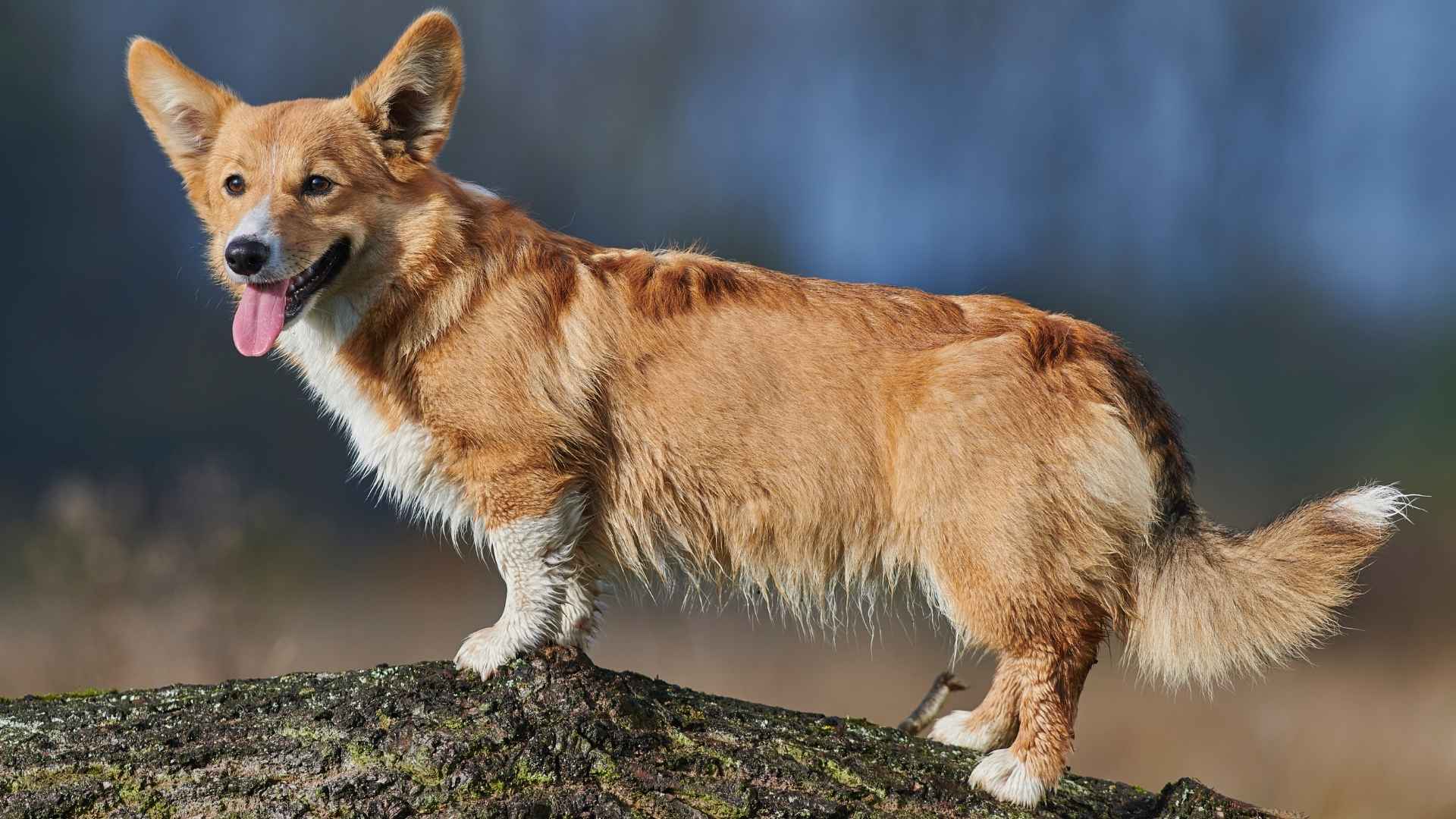When you picture your perfect furry buddy, you might first think of a tiny cuddle monster or a playful mid-sized pup. But guess what? Some of the most loyal, lovable dogs come in a very long package! That’s right — long dog breeds bring their own special charm, with bodies that stretch out in all their glory.
From the classic wiggly dachshund to corgis that seem to glide on air, these pups prove that length definitely adds character. Whether they’re trotting beside you on a walk or curling up for a nap, long dog breeds have a way of stealing hearts with their unique shapes and big personalities.
So, if you’ve ever wondered about those extra-long pups out there, stick around — we’re diving into what makes these stretched-out dogs so wonderful, lovable, and downright fun to know!
Long Dog Breeds
1. Dachshund
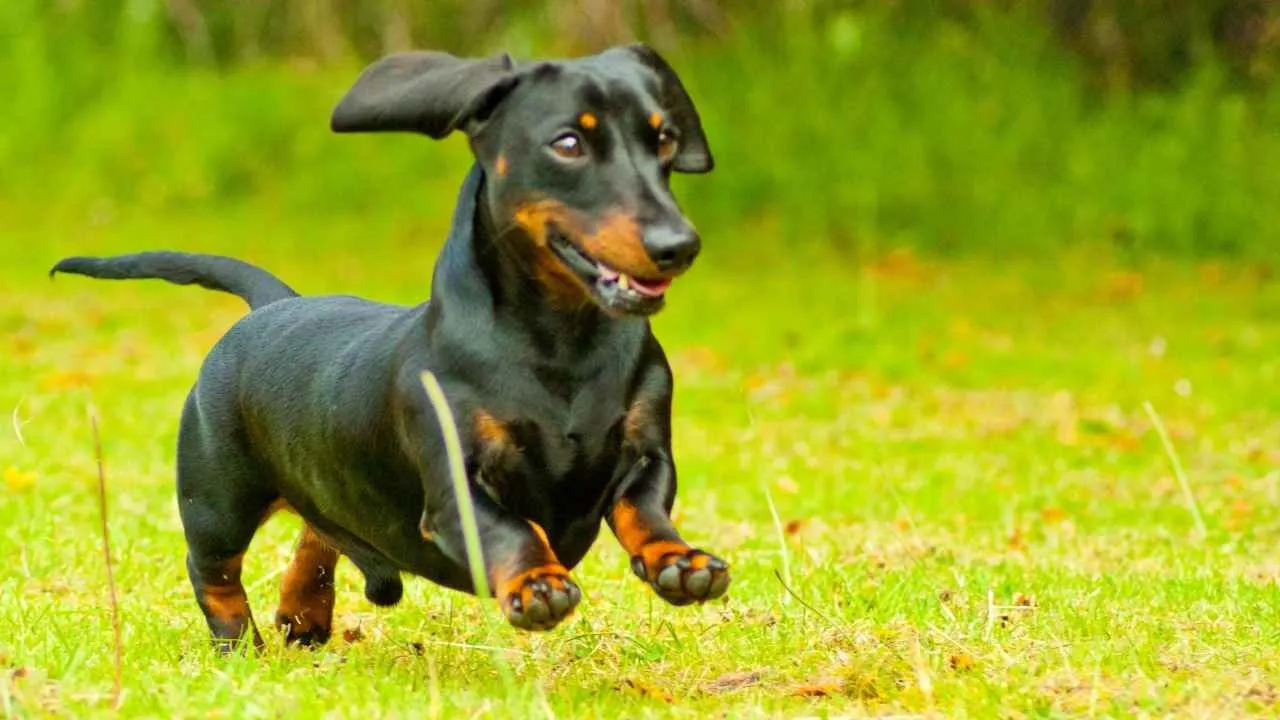
Meet the Dachshund — that charming little sausage-shaped dog you’ve probably seen waddling around with big ears and even bigger attitude. Originally bred in Germany to chase badgers out of their burrows (hence the name, which literally means “badger dog”), this long-bodied hound breed is anything but ordinary.
With their deep chests, short legs, and playful personalities, Dachshunds come in two sizes—standard and miniature—and three coat styles: smooth, longhaired, and wirehaired.
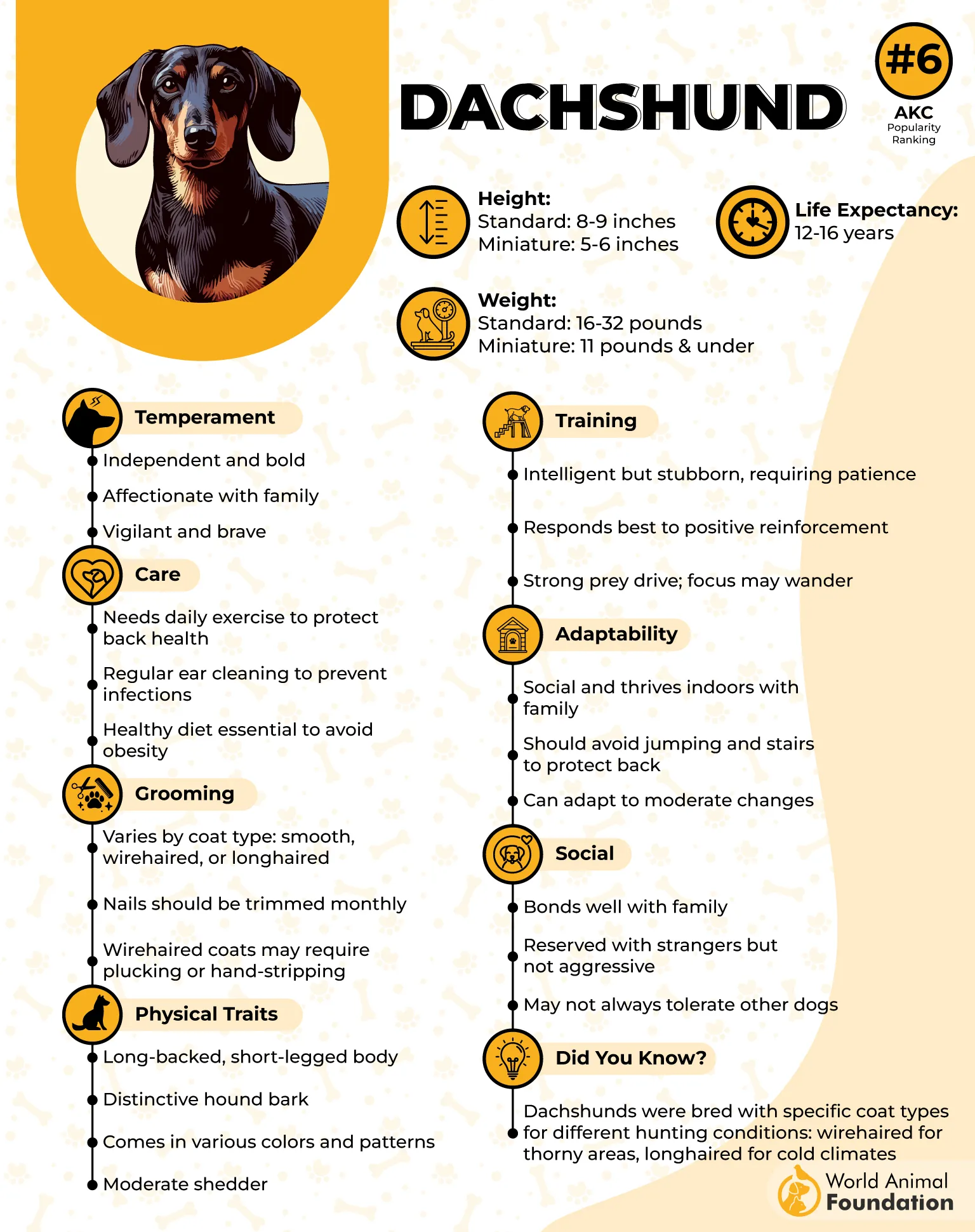
These “wiener dogs” pack a ton of personality. They’re brave, clever, and loud enough to make great watchdogs. Loyal and playful, they fit right into family life and usually get along well with kids and other pups.
Training them, though? That’s where their stubborn streak shines. They like to do things their way, but a little patience and lots of treats usually win them over.
As noted by Britannica, Dachshunds are energetic explorers with a nose for adventure, thanks to their hound heritage. They love sniffing out trails but might ignore your “come back” calls, so a secure yard or leash is a must. They’re affectionate with family but tend to be wary of strangers—and definitely not fans of tiny rodent pets (sorry, hamsters!).
Dachshunds are prone to back issues thanks to their long spines and short legs. So skip the stairs and furniture jumping, keep them active but careful, and watch that waistline to keep their backs happy and healthy.
Fun fact:
The famous “hot dog” sausage might actually owe its name to this quirky small dog!
2. Basset Hound
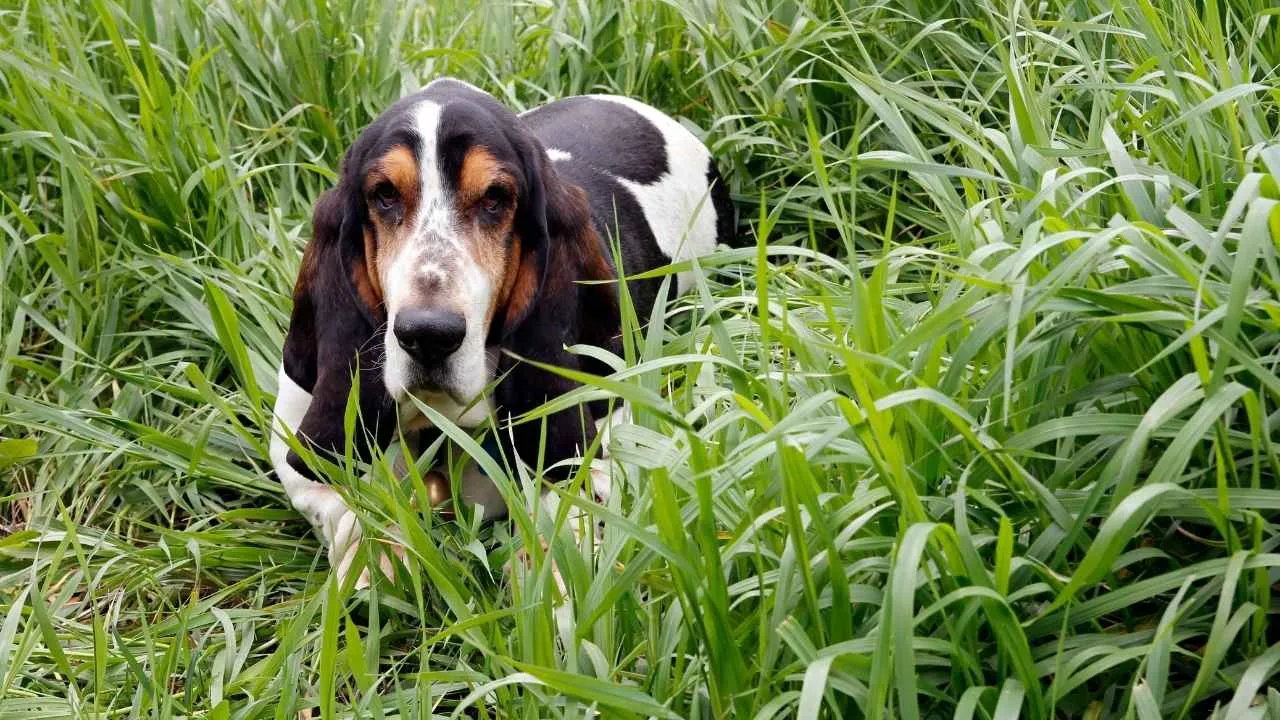
Don’t be fooled by their short legs and low stature — Basset Hounds pack a surprising amount of bulk! These heavy-boned, medium-to-large dogs typically weigh between 40 and 80 pounds, with a long body stretched out over those famously crooked legs.
Their big ears, droopy face, and soulful eyes give them that classic “I’m adorable but also a little sad” look that melts hearts everywhere. And yes, their tail often wags proudly in a cheerful curve, making them instantly recognizable wherever they go.
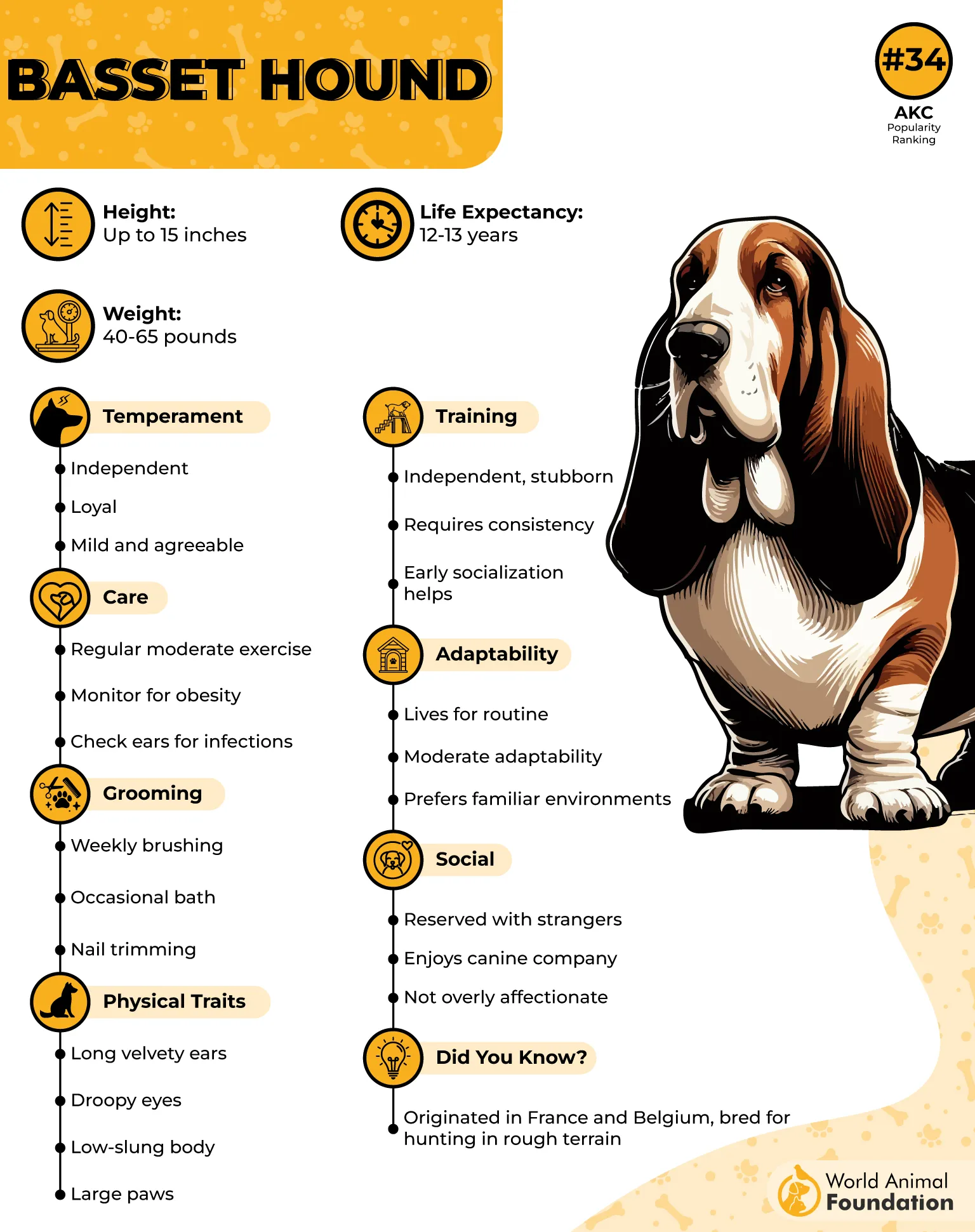
Bassets are all about the laid-back life. Friendly and easygoing, they adore hanging out with their humans and get along famously with kids and other pets. But don’t let their chill vibe fool you — these scent hounds have a strong hunting instinct and a nose that’s always on the move.
The American Kennel Club (AKC) states that their stubborn streak can make training a bit of a challenge. This is because they were bred to follow smell and scent single-mindedly. Thus, patience and plenty of treats are a must. And heads up: they love to dig and bark a lot if left to their own devices.
Living with a Basset means daily walks (to keep those long backs healthy) and plenty of cuddles. They’re not high-energy athletes, but staying active is important to avoid the weight gain that can put strain on their spines.
Pro tip: no jumping off furniture or cars — those long backs are delicate! They’re also notorious droolers, so keep a towel handy for those slobbery kisses. With their sweet nature and quirky charm, Basset Hounds make loving, loyal companions who brighten any home.
3. Pembroke Welsh Corgi
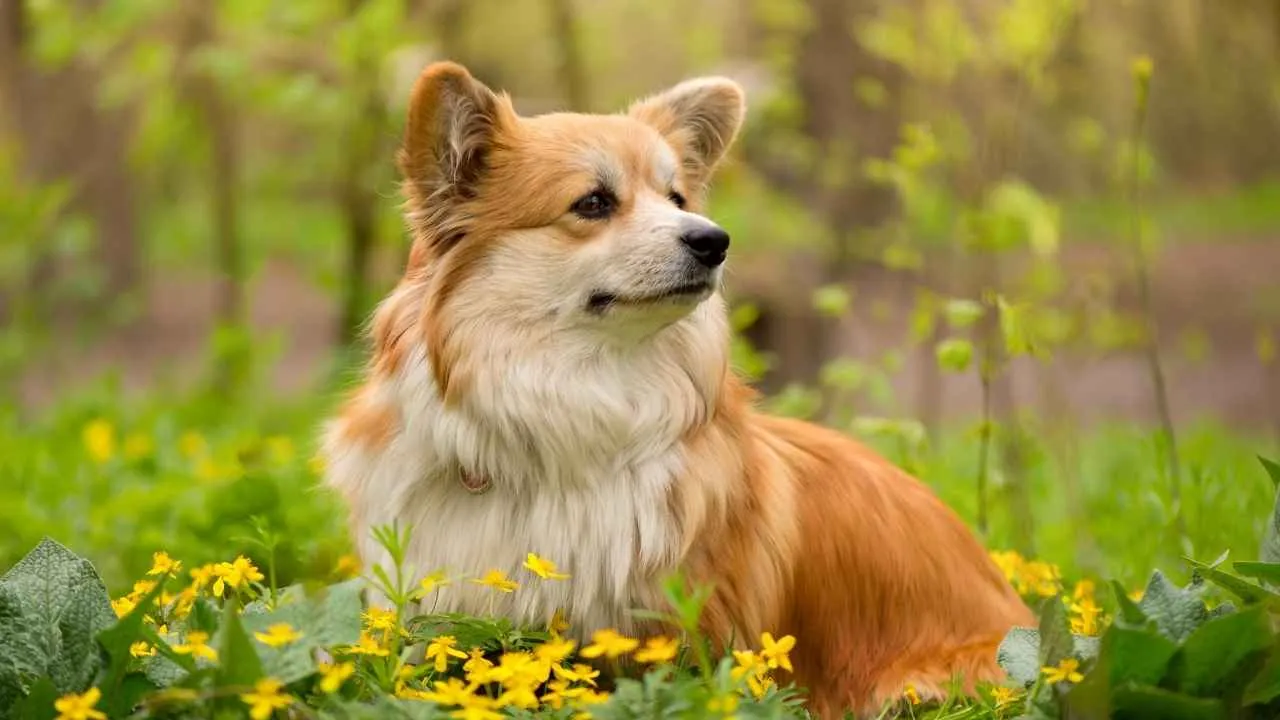
Pembroke Welsh Corgis might be small in size, but they’re big on personality and history! This breed originated in Wales as a livestock guardian. These sturdy little “dwarf” herders have long bodies, short legs, and a thick double coat that keeps them comfy in all kinds of weather, though it does mean they shed like pros.
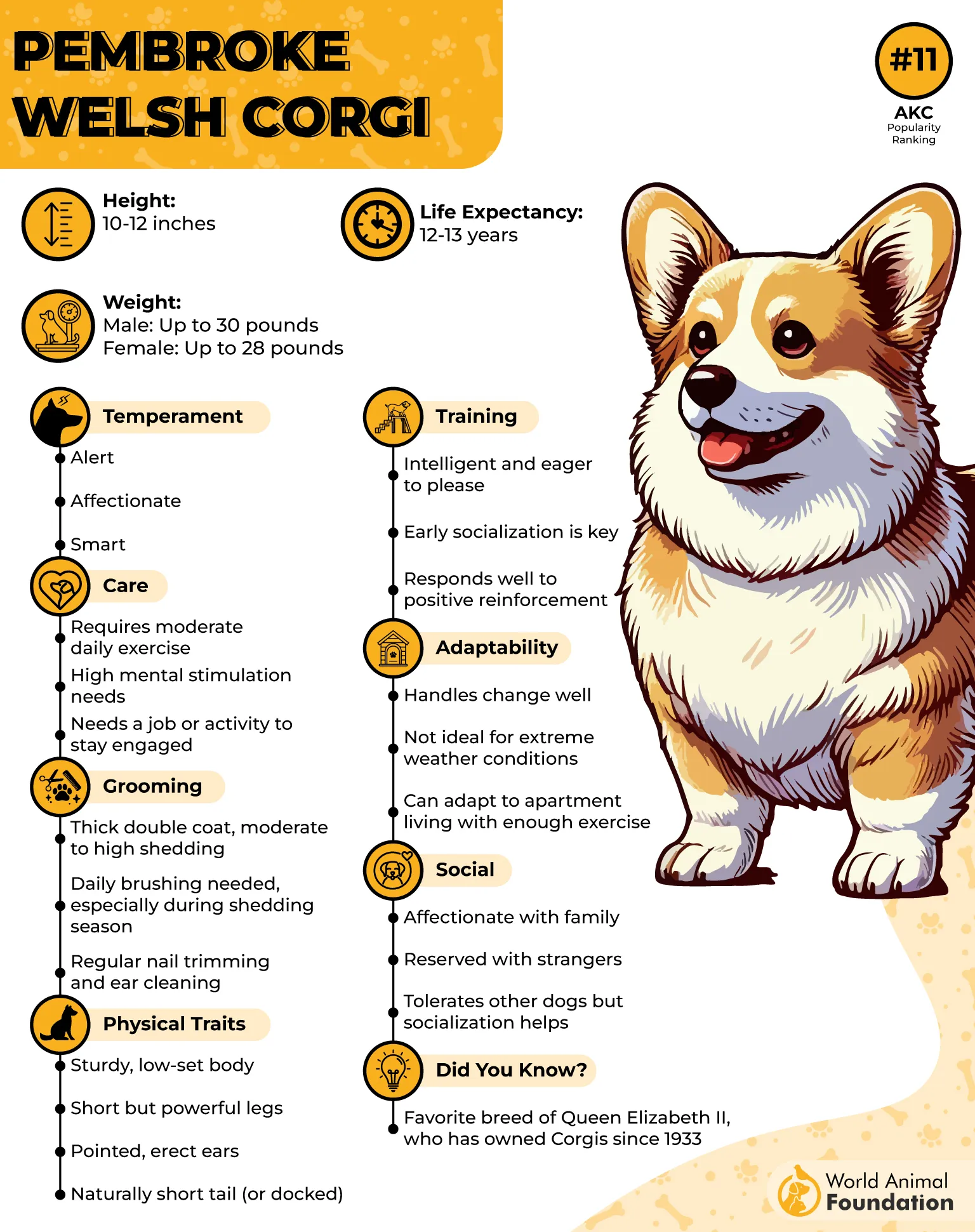
These clever pups stand about 10 to 12 inches tall and tip the scales around 27 to 30 pounds, with males usually a bit heftier than females. Known as “heelers,” their job was to nip at the heels of cattle to herd them along without getting kicked, explaining their low-to-the-ground stature. Today, they’re just as happy working the farm as they are ruling your couch.
Corgis are protective, playful, and incredibly loyal companions who thrive on having a purpose and being part of the family. They rock those foxy faces and perky ears, and despite their size, they’re strong little athletes.
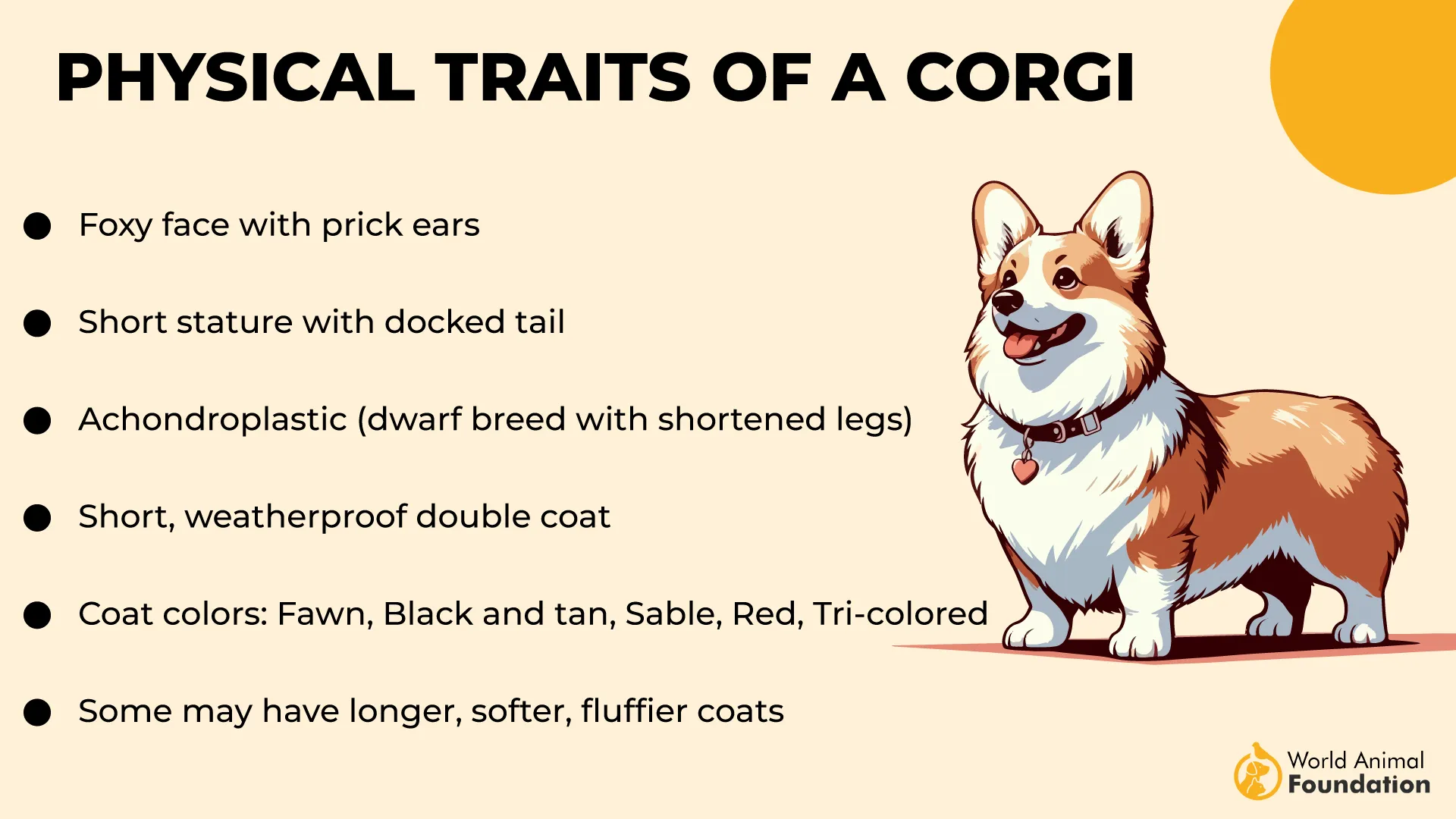
Most Pembrokes don’t have tails, giving them that iconic “look,” and some were even born with just a tiny stub!
From herding cattle to Royal dog, Pembroke Welsh Corgis came a long way. Queen Elizabeth II owned over 30 Corgis during her lifetime. In her 80s, she chose to stop breeding them, not wanting to leave too many behind after her passing.
Fun Fact:
Oh, and here’s a magical tidbit—folklore says these pups were once fairy steeds, pulling tiny carriages and even riding into battle!
4. Cardigan Welsh Corgi
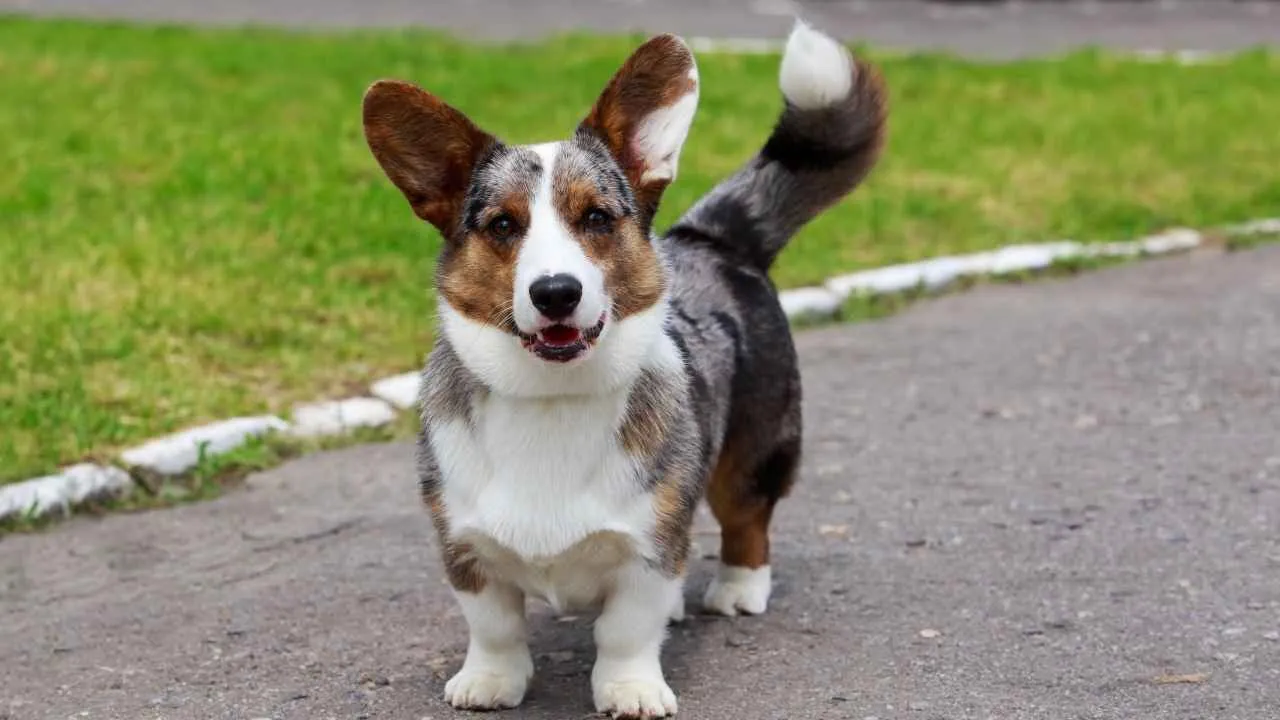
Meet the Cardigan Welsh Corgi—the long-tailed cousin of the more famous Pembroke. Named after Cardiganshire in Wales, these little herding dynamos pack a lot of charm into their sturdy, short-legged frames.
These corgis have a history as rich as their coats—descended from Celtic herders brought these flock guardians into Wales around 1200 BC, they were bred low to the ground to dodge cattle kicks while herding. Cardigans are clever, adaptable, and deeply loyal, bonding tightly with their families. While friendly, they’re also on alert around strangers, making them surprisingly good watchdogs.
Sporting a dense, harsh coat that comes in colors ranging from reddish brown and brindle to blue-gray with black spots, Cardigans are as striking as they are smart. With big, rounded ears and a bushy tail that sways low, these pups stand about 10 to 12 inches tall and weigh between 25 and 38 pounds.
Don’t let their calm demeanor fool you—Cardigans love to play and can be quite the nippers thanks to their herding instincts. So, if you’ve got little ones, a bit of training and supervision goes a long way.
WebMD states that with moderate to high energy levels, these pups thrive on daily exercise mixed with brainy challenges like agility or puzzle games. Just remember, for pups, short and gentle play sessions are best to keep those growing joints happy!
5. Skye Terrier
Don’t let that silky coat and short frame fool you—the Skye Terrier is no pushover. This loyal dog loves their family with all their (very fluffy) heart, but when it comes to strangers? Let’s just say they prefer a more “look but don’t touch” approach.
It’s not that they’re shy—they’re just…selectively social. Think of them as the introverts of the dog world: confident, cool, and a little bit aloof.
As noted by the American Kennel Club (AKC), true to their terrier roots, Skyes are independent thinkers with a strong will and a mind of their own. They’re not here to follow your every whim—they’ve got their own plans, thank you very much.
With a personality that leans toward the dominant side, they’re often happier being the only canine in the castle. Sure, they can live with other dogs if raised together, but they’d rather not share the spotlight.
This breed isn’t for the faint of heart or the first-time dog parent. They need a patient, experienced owners who understand that a little stubborn streak is all part of their charm. But for the right person, a Skye Terrier is a fiercely devoted companion who’ll happily rule your heart—and your home.
6. Sussex Spaniel
With their soulful eyes and trademark frowny face, Sussex Spaniels may look like they just read the ending of a sad novel, but don’t be fooled. Beneath that somber expression is a dog bursting with cheer, loyalty, and goofball charm.
Originally bred to flush game through dense undergrowth, these dogs were designed for business—with a compact frame, heavy bones, and those unmistakably short legs that give them a cartoonish, lovable waddle.
Despite their working-dog roots, they’ve got major cuddle energy and thrive on being part of the family circle. If you’re searching for a laid-back dog breed that doubles as a loyal shadow, this might just be your dog.
Standing just 13 to 15 inches tall and weighing between 35 to 45 pounds, Sussex Spaniels have a presence that’s hard to ignore. Their lush double coat—rich in that signature golden-liver hue—is wavy in all the right places, weather-resistant, and absolutely perfect for weekend strolls or backyard lounging.
When it comes to personality, the Sussex Spaniel is like your favorite homebody friend—gentle, affectionate, and happy just being near you. They bond deeply with their humans and often bring a little theatrical flair to playtime.
While they get along well with people of all ages, they might be a bit picky about sharing space with other pets. Training these pups requires a bit of patience (they can be stubborn), but with early socialization and lots of love, you’ll raise a confident, even-tempered companion.
Did You Know?
Though this breed is on the rare side (only about 600 in the U.S.!), they’re a hidden gem for the right home, especially if you’re looking for a devoted dog with charm, character, and a coat that shines like a golden sunset. Just don’t expect them to race around the yard—they’re more slow-and-steady than speed demon, and proud of it.
7. Field Spaniel
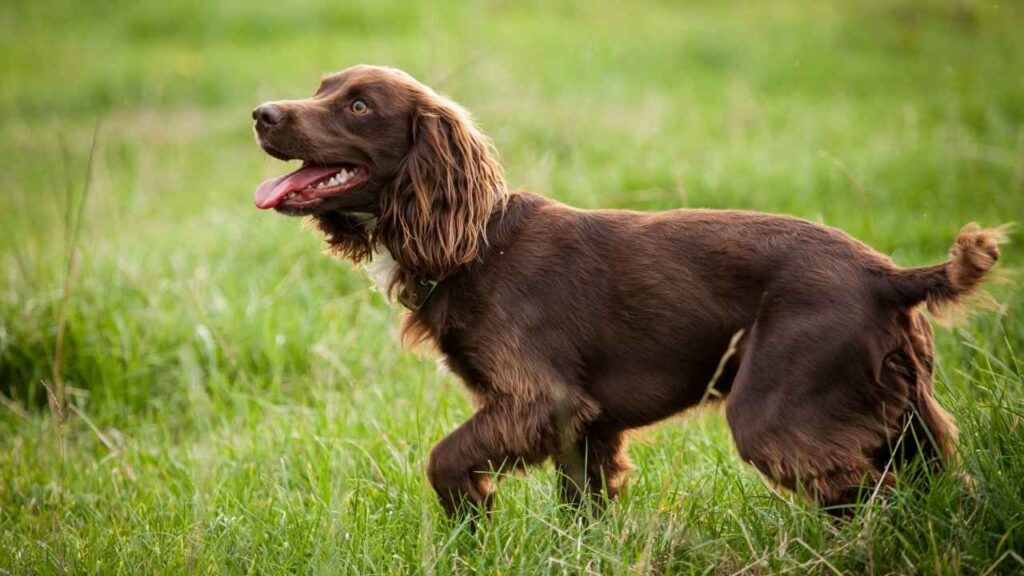
If you’re looking for a pup with the heart of a hunter and the soul of a snuggler, the Field Spaniel might just steal yours. These gentle beauties are often overshadowed by their more famous spaniel breed, but trust us—once you meet one, you’ll wonder why they aren’t everywhere.
Field Spaniels have that classic spaniel elegance—feathery ears, soulful eyes, and a luscious glossy coat that comes in deep liver, black, or a charming blend of the two.
Built a little longer and lower than your average spaniel, they’ve got a slightly oversized noggin and those signature floppy ears that practically beg to be stroked.
Despite their somewhat serious expression, these dogs are anything but grumpy. They’re famously sweet, sensitive, and gentle—like a therapist in dog form, but with a goofy side. Field Spaniels are quietly affectionate and incredibly loyal to their families. They’re the kind of dog that will curl up at your feet after a good play session and stay close without being clingy.
True to their sporting roots, Field Spaniels still carry the smarts and drive of a working dog. Purina states they’re naturally curious and love being outdoors, especially if there’s water involved—don’t be surprised if they treat their water bowl like a personal splash pad.
Training them is a breeze—they’re clever, eager to please, and just independent enough to keep things interesting. Early socialization helps them warm up to strangers (they tend to be politely reserved), but aggression? Never. In fact, they’re pretty unshakeable and great with children, though they prefer calm play over chaotic zoomies.
Conclusion
Long-bodied dog breeds offer a unique blend of beauty, strength, and loyalty. From long-haired dog breeds like the elegant Afghan Hound to gentle giants such as Great Danes, Italian Mastiffs, and Great Pyrenees, these large breeds are known for their strong sense of loyalty, great courage, and good-natured temperament.
While some make excellent guard dogs ready to protect their families, others are intelligent, easily trained companions, even suitable for apartment dwellers with the right care. Their thick fur and long hair make them well-suited for cold climates, but they do require extra attention, especially during grooming.
Whether you’re drawn to big dogs for their ability to guard or their companionship with children, cats, or even rabbits, choosing the right breed name starts with understanding their needs and strengths. These long-haired companions are more than just pets—they’re loyal protectors with hearts and sights set on the family.


